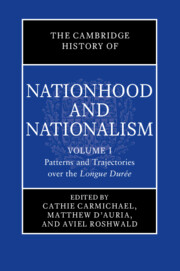Book contents
- The Cambridge History of Nationhood and Nationalism
- The Cambridge History of Nationhood and Nationalism
- The Cambridge History of Nationhood and Nationalism
- Copyright page
- Contents
- Figures
- Contributors
- General Introduction
- Part i The Politics of Ethnicity, Nationhood, and Belonging in the Settings of Classical Civilizations
- 1 Nationality and Ethnicity in the Ancient Near East
- 2 Nationhood: Was There Such a Thing in Antiquity?
- 3 The Holy Roman Empire
- 4 Ancient China
- 5 Politicized Ethnicity in Precolonial Southeast Asia
- 6 “India” before the Raj: Space and Identity in South Asian History
- Conclusion to Part I
- Part ii Paradigm Shifts and Turning Points in the Era of Globalization, 1500 to the Present
- Index
- References
1 - Nationality and Ethnicity in the Ancient Near East
from Part i - The Politics of Ethnicity, Nationhood, and Belonging in the Settings of Classical Civilizations
Published online by Cambridge University Press: 27 October 2023
- The Cambridge History of Nationhood and Nationalism
- The Cambridge History of Nationhood and Nationalism
- The Cambridge History of Nationhood and Nationalism
- Copyright page
- Contents
- Figures
- Contributors
- General Introduction
- Part i The Politics of Ethnicity, Nationhood, and Belonging in the Settings of Classical Civilizations
- 1 Nationality and Ethnicity in the Ancient Near East
- 2 Nationhood: Was There Such a Thing in Antiquity?
- 3 The Holy Roman Empire
- 4 Ancient China
- 5 Politicized Ethnicity in Precolonial Southeast Asia
- 6 “India” before the Raj: Space and Identity in South Asian History
- Conclusion to Part I
- Part ii Paradigm Shifts and Turning Points in the Era of Globalization, 1500 to the Present
- Index
- References
Summary
Ascertaining whether or not nations existed in the ancient Near East is not merely for the sake of determining historically when these territorial relations of social kinship appear.1 If the evidence, however complicated, suggests the existence of nations in the ancient Near East, a more accurate understanding of not only antiquity but also “modern times” should emerge, as the classification of the self and others on the basis of birth and residence in a territory would not have originated with the 1648 Treaty of Westphalia, and certainly would not be novel to the so-called “Age of Nationalism” of the nineteenth century.
- Type
- Chapter
- Information
- The Cambridge History of Nationhood and Nationalism , pp. 11 - 30Publisher: Cambridge University PressPrint publication year: 2023
References
Further Reading
- 1
- Cited by

